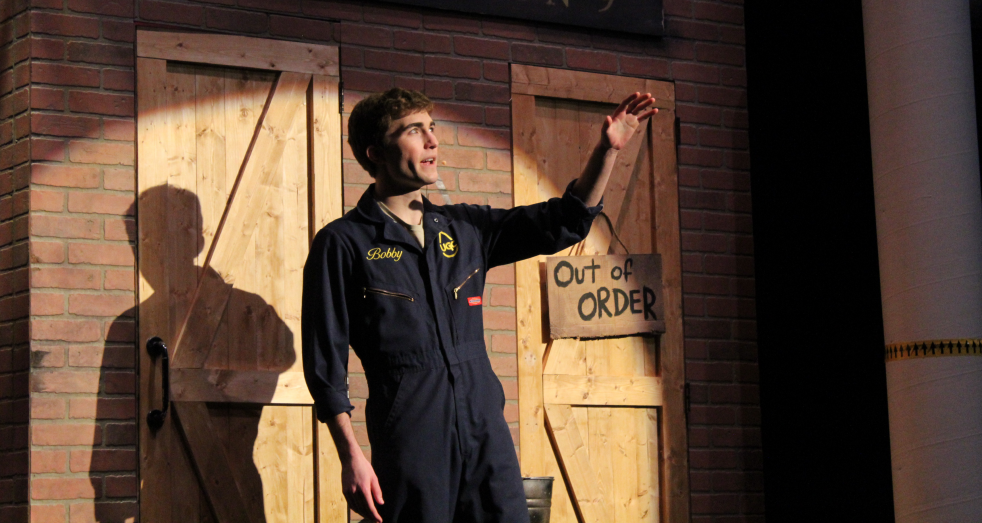The lights dim, hold and fade back in. We see disheveled bodies sprawled across the stage, lying next to “Public Amenity No. 9,” the filthiest urinal in town.
Officer Lockstock, performed hyper-charismatically by fourth-year ISYE Andrew Horton, ambles onto the stage and addresses the audience directly.
He welcomes us to “Urinetown” and then promptly clarifies that he means “Urinetown” the musical, which is not the same as “Urinetown,” the place within the musical “Urinetown.”
One of the major plot points throughout the play is the characters figuring out what the place, “Urinetown,” is. All they know is that those who pee without paying the government pee tax and relieving themselves in a public amenity get shipped off to “Urinetown.”
It is revealed apophatically by the half-character-half-narrator Lockstock early in the show that “Urinetown” is just a shallow euphemism for throwing offenders off of a very tall building, and more generally, that all the characters in fact live in “Urinetown.”
Before getting even halfway through act one, the audience is presented with three narrative devices that are the primary reason why any Tech student should devote one of their evenings to the viewing of this musical.
First, both the meta-ambivalence and canonical ambivalence of the meaning of “Urinetown” reminds us of the often pernicious subjectivity of language.
When using language today, especially political language, we should always remind ourselves that language is not an objective model of reality. It is merely a human tool much like a hammer or a shovel. While a shovel is used to shape dirt and earth, language is used to shape reality.
“Urinetown” the musical is separate from “Urinetown” the concept, which both is and is not “Urinetown,” the place within “Urinetown” the musical.
This kind of polysemy can be found everywhere in the modern cultural landscape. What one calls “Patriotism” another calls “Terrorism.” What one calls “Allah” another calls “God.” What one calls “Truth” another calls “Lie.”
Second, “Urinetown”’s hard to swallow, dialectical materialist messages are delivered with the lubrication of humor.
The play’s comedic spine is the absurdity of the class issue of the right to pee, the right to engage in a basic human act. The broad, humorous subject of the play’s class struggle serves as an admonition that history does not repeat itself — but it always rhymes.
Third, as fourth-year AE student director Noah Shirk said, “Urinetown is a very absurd concept and theme but all the character interactions are very genuine.”
It is deceptively easy to write a play or an artistic text with a black hole of humorous self-referentiality and a vacuum of real content, and Urinetown manages to have both in spades. As any CS major knows, a function that only calls itself simply returns None.
In an era where absolutely everything feels unprecedented, looking back at history and into stories written by prescient authors can help make the world feel a bit more precedented.
“How do we, through comedy and through music, realize that we are headed down this path?” Melissa Foulger, Artistic Director of DramaTech, asked. “How do the people in the story handle that?”
Even for the student who has little interest in Brechtian Marxism and ironic musical numbers, the distinctly human quality of live theater cannot be understated.
“We as humans have a desire to be with others,” Foulger said. “We are tribal in nature. When we’re able to connect with someone else, it does something to our bodies that sitting alone in a room doesn’t do.”
